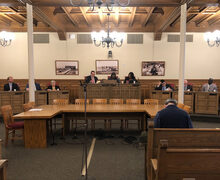SU professor fosters love for Shakespeare through scholarly work
Liam Sheehan | Asst. Photo Editor
Dympna Callaghan's love of Shakespeare began when she was 12 years old, after she read "A Midsummer Night's Dream" for the first time.
Dympna Callaghan was 12 years old when she read her first Shakespearean play, “A Midsummer Night’s Dream,” for a class. She remembers her excitement in building a model of an early modern stage and using one of her favorite dolls, which happened to have dark skin, to represent her favorite character in the play, Bottom.
In that same class, Callaghan’s seat was underneath an image of William Shakespeare — a presage for things to come. She found it interesting that in a sense, she anticipated the now colorblind casting of Shakespearean plays, a topic she would often write about in the future.
“I thought about why most of the actors then were white, and obviously that’s not true anymore,” she said. “It’s kind of funny that some of the ideas that subsequently came to preoccupy me were a little bit sparked even then.”
Callaghan, an English and textual studies professor at Syracuse University, has always been fascinated by the intricacies of language, particularly that of the early modern period. But the playwright and poet William Shakespeare, whose 400th death anniversary will be celebrated Saturday, has been a significant and central figure in her work.
In a way, Callaghan is living a double life. She’s originally from Leeds in northern England, but loves everything about the United States, especially after falling in love with Walt Whitman’s “Leaves of Grass.” Her two master’s degrees — one in American studies from Bowling Green State University in Ohio, and the other in Renaissance literature from the University of Sussex in England — reinforce her love for the two fields.
I compromised. I said to myself, ‘I’ll live in America and study English renaissance.’ The idea of being in a new country where there are new possibilities and breaking old paradigms — that continues to interest me.Dympna Callaghan
A few years after she received her doctorate in philosophy, also from University of Sussex, Callaghan moved back to Ohio to serve as the interim director of women’s studies department at Bowling Green. But she soon found she missed “the words of the past” and knew she belonged teaching in an English department.
Callaghan moved to SU in the ‘90s after being offered a three-year post-doctorate as the Emerson Faculty Fellow in Modern Letters. After just a year, the department offered her a position as an assistant professor. She decided to trade the fellowship in for the security of a tenure track position because she saw a future for herself at Syracuse, and has been at the university ever since.
As a Shakespeare professor, Callaghan said she knew the most important conference for her to attend was that of the Shakespeare Association of America, a professional organization of scholars and professors who study and teach Shakespeare’s works and their cultural contexts. As of today, she said she hasn’t missed a single conference in the past 20 years.
“It’s not a fan club. It’s not like that where we’re all agreeing about how wonderful (Shakespeare) is,” she said. “We’re doing deep intellectual work on literary studies and all manner of things, and it’s an intellectually challenging and vibrant community.”
It was during Callaghan’s term as president of the SAA a few years ago that the organization decided to publish a volume to commemorate Shakespeare’s 400th death anniversary. The volume, “Shakespeare in Our Time,” was released earlier this year and is a “snapshot” of where Shakespeare studies are right now, she said.
Now, Callaghan is working with history professor Carol Faulkner, who she has known for about 10 years, on a project about Edwin Booth, a famous actor at the time who played the lead in the longest-running production of “Hamlet.” Faulkner emphasizes in 19th century American history and said the project will examine the political significance of “Hamlet” during the Civil War.
Here’s a scholar of Shakespeare and ‘Hamlet,’ several centuries removed, and here’s a scholar of the 19th century U.S. — can we try to say something new about this production of ‘Hamlet’ and what it might have meant to the citizens of the United States?Carol Faulkner
Part of the thought process behind their endeavor, Faulkner added, is wondering if it can even be done. They had originally planned to write something on the shorter end of things, but they quickly realized it warranted a bigger format because of how expansive the topic of the Civil War is.
Thanks to a grant from SU, Faulkner said she and Callaghan will determine when in 2016 they will publish the project.
“It’s such an interesting intellectual experiment because we’re stepping outside both of our scholarly comfort zone,” Faulkner said.
Amy Burnette, a Ph.D. candidate studying early modern literature, is Callaghan’s research assistant, gathering material for the Edwin Booth project. Burnette and Callaghan have known each other since 2010, when Burnette decided to pursue a doctorate degree at SU.
While she was looking at doctorate programs, Burnette said she applied to Syracuse with the sole intention of working with Callaghan. Burnette said that while she was working on her thesis, Callaghan’s works on Shakespeare and feminism were her “go-to” resources.
“I was not looking so much at what was the best program out there — I mean, of course I still wanted a good program — but I was looking at universities where scholars who were influential on me, where they were,” Burnette said. “That was the reason I applied here, to work for Dympna.”
Burnette is approaching her seventh year of working with Callaghan, who is also her dissertation adviser. She said she’s constantly in awe of Callaghan’s ability to “produce forward thinking scholarship at such a fast pace.” The two of them will sometimes meet at Barnes & Noble or at their shared office in Hall of Languages to discuss, among other things, Burnette’s dissertation.
Her dissertation involves a chapter surrounding one of Shakespeare’s later plays, “The Winter’s Tale.” She likened Callaghan to one of the characters in that play, Paulina: loveable, caring, rhetorical and “tells it like it is.”
(Paulina) also has this magical quality about her, too. ... She has this sort of curious superhuman power, but mostly she is a woman who is for other women. That’s Dympna.Amy Burnette
While she doesn’t have a favorite Shakespearean play — having read all 37 of them — Callaghan absolutely loves Shakespeare’s poems. She works on figures other than Shakespeare, but his work, particularly his sonnets, are something she calls “exquisite lyrical expression.”
“Ben Jonson once said, ‘Look not on his picture but on his book,’” Callaghan said. “Read his work, read his book. That’s Shakespeare’s legacy to the world.”
Published on April 20, 2016 at 9:24 pm
Contact Clare: clramire@syr.edu





